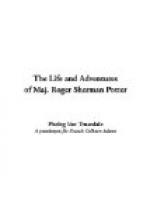Having passed the night in refreshing sleep, I was up with the sun on the following morning, and before noon had received the calls of several distinguished citizens, two or three of whom requested that I “remain over,” and deliver an address on the state of the nation. Offering my inability as an apology for not complying with their request, I was surprised that so obscure a person should receive such homage. The mystery, however, was very soon explained. The major, adopting the method in fashion with some of our modern politicians, had been actively noising it about, that no greater politician than myself ever lived; and that, being on my way to Washington in search of a foreign mission, I had generously invited him to accompany me. The major was indeed building up my reputation with a view to the consolidation of his own. He had also deluded the editor of the Patriot, (who was a man much given to good jokes,) into writing several long articles in compliment of my political achievements, and which were of so serious a style, that the distant reader, unaccustomed to the tricks of editors, must have been grievously misled. And indeed such was the fact, for the political excitement makers of New York had no sooner seen the article copied into their newspapers, than they set about contriving a plan by which to rob the city treasury of some thousands of dollars, under the pretext of giving me a public reception worthy of the city and so great a man.
Toward evening, the major made his appearance in the “Independent Temperance,” and handing me a copy of the New York Herald, pointed to a letter in its columns, written by one Don Fernando, who it was said hoped soon to be mayor of the city, which office many persons seriously believed had been created for the accommodation of men happily endowed with a fondness for showing their greatness, which was the case with the aspiring Don Fernando, whose light was no taper burning in a small space. The letter set forth, with many flourishes, the necessity for showing proper respect to one so distinguished in the political world. And this the major held to be a significant token of the success that awaited us. He further hinted that the next thing we should see would be a resolution introduced at the Board of Common Council, (provided a member could be found sober enough to do it,) to vote a sum of money adequate to the occasion, with an additional clause, that a committee be appointed to carry out the arrangements. But why should not a worthy servant of the people be thus honored? There were those of the honorable council who held it no harm to be liberal in the treatment of distinguished strangers, seeing that it cost them nothing, and might, by some bare possibility, afford them an opportunity of making a speech, as well as indulging a natural passion for free drinks. The major was in ecstasies with the prospect, and now disclosed to me the fact, that he had sold out his stock of tin ware for two hundred dollars, his Shanghai




